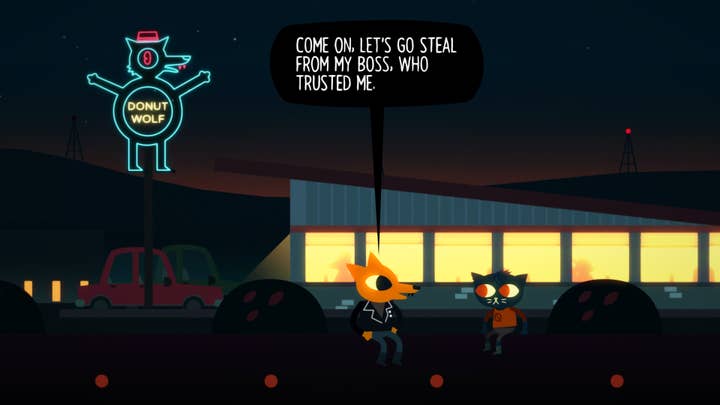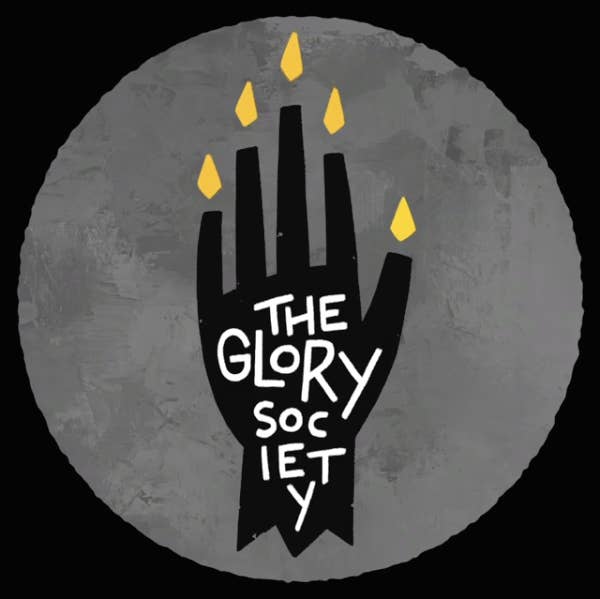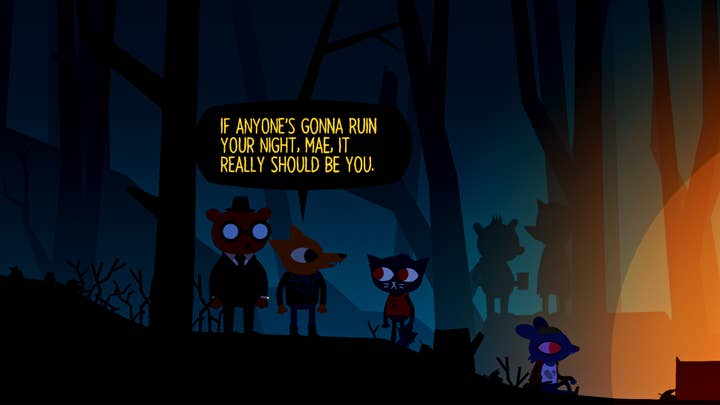Black jackets, sunglasses, and radical accountability as a worker co-op
Scott Benson and Bethany Hockenberry explain why and how The Glory Society follows a "no bosses needed" model
Can a game studio, a creative team, or a business run democratically without any bosses or hierarchy at all?
In a year that's already seen backlash against bosses of major corporations for earning millions while laying off hundreds, the prospect may seem tempting. But for Night in the Woods co-creators Scott Benson and Bethany Hockenberry, the idea has been percolating for quite some time.
Along with artist and musician Wren Farren, the pair announced the formation of a new development studio called The Glory Society earlier this week. The studio is working on at least two projects at the moment, and is structured as a worker co-operative. All three of them are co-owners as will be anyone else who joins them. "No bosses needed," reads their company website.
Benson tells GamesIndustry.biz that while it seems radical, the concept for a worker cooperative is actually quite simple. The entire business is owned, operated, and run by all the workers. Decisions are made by coming to a group consensus, and any business-related decisions or changes that will affect the group's projects are democratically voted on.
Especially for a small studio (The Glory Society only consists of the three of them for now), that sounds doable enough. But Benson and Hockenberry say that setting the studio up to run that way in the first place wasn't an easy process. That wasn't because the actual set-up was any more complicated than establishing any other studio, but rather because in the United States, such businesses are rare on the whole and even rarer in the gaming industry.

"When people hear 'co-op' they think of like a place you join and buy produce from, or maybe REI or something," Benson says. "Those are consumer co-ops, which are very different from worker co-ops. We spent a long time, alongside other work we were doing last year, just reading a lot and asking questions of people we could track down.
"We've got a pretty good handle on it now I'd say. Regulations on co-ops as an official business type vary per state, and in some states I don't think they're even recognized as a separate kind of business. But eventually we found you don't need to go the state-mandated route. You can just start an LLC, S-Corp, whatever and organize it in this fashion as far as ownership, shares, operating agreement, etc."
"Everything is set up for top-down structures so it did take some time finding a lawyer and accountant who understood"
Bethany Hockenberry
Hockenberry adds, "There were a lot of times we would come across situations that would require extra steps if you aren't doing it the 'traditional' way. Everything is very much set up to be based on having a boss making the decisions, signing papers, being in charge of profits.
"Everything is set up for top-down structures so it did take some time finding a lawyer and accountant who understood. Luckily we found a lawyer and an accountant who were not only knowledgeable but also excited about what we're trying to do."
Despite their rarity, worker co-ops aren't entirely unknown in the gaming industry. One fairly well-known co-op studio is Motion Twin, developers of Dead Cells. Though Benson notes Motion Twin specifically wasn't Glory Society's inspiration, reading and learning about the company's structure encouraged the team that they weren't alone. And other studios were eager to offer advice, too.
"Ted [Anderson] from Pixel Pushers Union 512 was super helpful, and of course our good friend Saleem [Dabbous] from KO_OP in Montreal," he says. "They had a whole lot of like ground-level info and thoughts on how to think about this whole thing, and what a few potential pitfalls are. I think one of the best bits of advice we got was from Saleem who was very clear about how hierarchies can form even in non-hierarchical spaces, and how vigilant you have to be in recognizing and dealing with that."

Another element in the team's favor was that a worker co-op structure wasn't too far off from the way Benson and Hockenberry had worked on their previous title alongside Alec Holowka. As Infinite Fall, the team talked through its decisions together without much of a particular structure.
The success of Night in the Woods helped Benson and Hockenberry get The Glory Society off the ground from a financial aspect, as well.
"Night in the Woods' success made this much easier in the sense that we have some cash kicking around to make this work full time, but that's the same as it would be with any business we started up, co-op or no," Benson says. "But you don't need to have that to start one of these. It may not be immediately a full-time paid job at first, but you and your fellow worker-owners can tackle that together. Co-ops have this built-in level of, well, cooperation."
"You don't need to have [a previous successful game release] to start one of these"
Scott Benson
A studio with a "no bosses needed" structure coming from Benson and Hockenberry shouldn't be a surprise to anyone who's either played Night in the Woods through, or followed Benson in particular on Twitter. The two have been outspoken in the past about their views on workers' rights, and in that regard, Glory Society seems to answer a lot of their frustrations with traditional business structures.
Simply eliminating bosses, Benson says, is a transformative change from which other benefits such as "radical accountability, democracy, [and] transparency" follow.
"And it's pretty cool. We could all get black jackets and sunglasses and motorcycles and own the streets. The possibilities are endless.
He adds, "The top-down model is inherently exploitative, so let's just lose that mess altogether. We set our own rules, expectations, salaries, and schedules together. It just immediately changes your relationship to one another, and the work, and so forth. And worker co-ops tend to have higher worker satisfaction, lower turnover, etc. It's just a better deal all around."
Hockenberry says it's particularly helpful to have a structure that ensures equal compensation and acknowledgement on the team.
"It sucks when you're working at a place and you're contributing so much to its existence but there are a few people at the top who are getting the profits and also making all of the decisions about your benefits, healthcare, your hours."
To hear Benson and Hockenberry tell it, a worker co-op seems to have few, if any disadvantages. Benson says that if there are any downsides to the model, they are "in ways that don't much matter," though he does note that it is "WAY harder for one of us to embezzle loads of money."
One possible concern is that so far, the handful of known worker co-ops in the gaming industry are all fairly small, so there's not yet a good model for how large such a structure can scale. Benson says that Motion Twin recommended an ideal size of 10 to 15, but thinks theoretically a studio could just keep getting bigger if scaling is done carefully and with the right people.
"The only extra ingredients here are transparency and democracy. Which are pretty ok ingredients?"
Scott Benson
Both Benson and Hockenberry also point out that just because everyone makes decisions together doesn't mean that a co-op like The Glory Society doesn't have specialization. Benson describes his role "as a sort of creative director." Hockenberry serves as a financial officer, while Farren specializes in art and music. All three have a say in what the others are doing, but are willing to defer to those with expertise for the most part.
"You do need some sort of direction, which is my job to like nudge us in, but I'm not the final word," Benson says. "We talk, we make choices, we kick things around. It takes a degree of trust and flexibility and generosity with each other...The only extra ingredients here are transparency and democracy. Which are pretty ok ingredients?"
Benson and Hockenberry -- along with Pixel Pushers Union 512's Ted Anderson, Motion Twin's Steve Fillby, and Talespinners' Ian Thomas -- will be presenting a panel at GDC entitled "Embracing the Co-Op Studio Model in Indie Games." The group will discuss the benefits of the worker co-operative model, as well as offer guidance to those looking to start one themselves.
In the meantime, Benson offers the following advice:
"I know that folks over at Game Workers Unite are putting together a batch of resources, and I'm helping with that," he says. "So stay tuned for that one. Otherwise you can do what we did, which is Google how co-ops work, check out some sample by-laws, look around for any co-operative organizations in your city or state, take in some online media about it -- check out Upstream Podcasts's two-parter on the topic, as well as Richard Wolff's YouTube lectures about co-ops -- see if your state has any regulations or structures set up for co-ops and what they are, and go from there.
"You'll probably need to find a lawyer to get you set up, and there are helpful ones out there who will walk through this process with you. It's 100% doable. And as more and more people do it, we'll all be able to share info and best practices and resources and so forth. It's a path we need to make well-trodden so it's easier to get from here to there."

